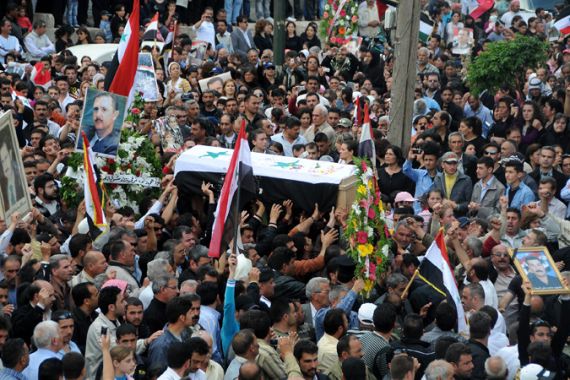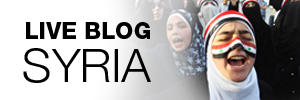Syria tightens control over more urban areas
Troops backed by tanks have reportedly entered Tafas in the south and the central city of Homs.

| Syrian army has vowed to hunt down and arrest opponents of President Bashar al-Assad [Al Jazeera] |
Syrian troops backed by tanks have entered residential areas in the country’s third largest city, Homs, and Tafas, a town in the south, activists say.
The forces reportedly entered the Bab Sabaa and Bab Amr neighbourhoods in Homs in the early hours of Sunday amid the sound of gunfire.
A 12-year-old child was killed, according to rights groups, but Al Jazeera could not independently verify the report.
Residents told Reuters news agency that at least eight tanks moved into Tafas, near the southern flashpoint city of Deraa, around 6am. Gunfire was heard and army and security forces broke into houses to arrest youths, they said.
Thousands of villagers from the rural Hauran Plain converged on Tafas on Friday and chanted slogans demanding the overthrow of President Bashar al-Assad.
The army intensified its presence across the Hauran region, having partly pulled out of Deraa this week and redeployed in nearby rural towns, witnesses said.
 |
Protesters have been prevented from entering Deraa, which remains surrounded by tanks, even after troops withdrew from the city following an 10-day siege. Activists say dozens of people were killed during days of “indiscriminate” shelling of the city.
Online activists said around 30 tanks remained inside the coastal city of Baniyas on Sunday, a day after security forces conducted a raid there.
They said 250 people had been detained.
A Syrian rights campaigner told the AFP news agency that security forces killed four women who were among about 150 people demonstrating on the main coastal highway from Marqab village, near Baniyas, calling for the release of detained people.
“Members of the security forces asked them to leave and, when they refused to do so, they opened fire killing three of them and wounding five others who were hospitalised,” the activist said.
Meanwhile, in the city of Deir El-Zour, demonstrators have torn down a golden statue of President Assad’s elder brother, Basil, who had been the presumed heir to Hafez Assad.
Investigation demanded
The Syrian Observatory for Human Rights, a London-based group, said security forces killed at least two others during the tank-backed army attack on Baniyas and demanded that authorities allow an independent committee to investigate the deaths.
The army entered Baniyas from three directions, advancing into Sunni districts but not Alawite neighbourhoods, the rights campaigner said.
| Analysts warn of possible sectarian strife spreading throughout the region from Syria [Al Jazeera] |
The Syrian military confirmed that it conducted an operation in Baniyas, a Mediterranean coastal city of 50,000 people, on Saturday.
“Army units and security forces today pursued members of terrorist groups in and around Baniyas and neighbourhoods of [the southern flashpoint town of] Deraa to restore security and stability,” the military official said.
“They arrested people and seized a quantity of weapons that these groups have used to attack the army and citizens and scare people.”
The attack came just hours after the US, reacting to the death of 27 protesters on Friday, threatened to take new steps against Syria’s rulers, drawn mostly from the Alawite sect, unless “they stopped killing and harassing their people”.
Call for elections
Against this backdrop of a bloody crackdown, activists called on Assad to hold elections in six months in order to bring to an end the seven-week-old crisis.
The Syrian Revolution 2011, a Facebook group that has been a motor of the protests, urged Assad to “stop shooting at demonstrators, allow peaceful demonstrations … release all political prisoners, allow political pluralism and free elections in six months”.
In a statement posted online, it told Assad he could be the “pride of contemporary Syria” if he transformed Syria “from a dictatorship to a democracy.
“The Syrians will be grateful and it is possible to do”.
Tens of thousands of people took to the streets on Friday in a “day of defiance”, calling for democratic reforms.
Rights groups said 27 protesters were shot dead by security forces on Friday while the military said 10 soldiers and policemen were killed in Homs by “armed terrorist groups”.
The Committee of the Martyrs of the 15 March Revolution, which has been keeping a tally of the dead, puts the death toll at 708.
Syrian authorities have banned foreign media from reporting from the country. As a result of these restrictions, Al Jazeera cannot independently verify these figures.
Meanwhile, concerns remain for the welfare of Dorothy Parvaz, an Al Jazeera journalist, who has not been heard from since she arrived in the capital, Damascus, more than a week ago.